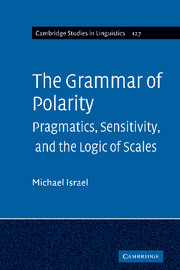Book contents
- Frontmatter
- Contents
- List of figures
- List of tables
- Acknowledgments
- List of abbreviations
- 1 Trivium pursuits
- 2 Ex nihilo: the grammar of polarity
- 3 Licensing and the logic of scalar models
- 4 Sensitivity as inherent scalar semantics
- 5 The elements of sensitivity
- 6 The scalar lexicon
- 7 The family of English indefinite polarity items
- 8 Polarity and the architecture of grammar
- 9 The pragmatics of polarity licensing
- 10 Visions and revisions
- Appendix: A catalogue of English polarity items
- Notes
- References
- General index
- Person index
2 - Ex nihilo: the grammar of polarity
Published online by Cambridge University Press: 07 September 2011
- Frontmatter
- Contents
- List of figures
- List of tables
- Acknowledgments
- List of abbreviations
- 1 Trivium pursuits
- 2 Ex nihilo: the grammar of polarity
- 3 Licensing and the logic of scalar models
- 4 Sensitivity as inherent scalar semantics
- 5 The elements of sensitivity
- 6 The scalar lexicon
- 7 The family of English indefinite polarity items
- 8 Polarity and the architecture of grammar
- 9 The pragmatics of polarity licensing
- 10 Visions and revisions
- Appendix: A catalogue of English polarity items
- Notes
- References
- General index
- Person index
Summary
It's hard to imagine
that nothing at all
could be so exciting
could be so much fun.
Talking Heads, from the song Heaven (1979)The simplicity of negation
Nothing, it seems, could be simpler than negation. Nor could anything be more indispensable. No language could go without some way of saying “no,” nor could any speaker. A basic logical primitive, negation is one of the fundamental building blocks of cognition. It is hardly an exaggeration to say that without such a basic conceptual ability, objective thought itself would be impossible. We cannot know how the world is, unless we also know how the world is not. Even the simplest affirmation is only meaningful in so far as it contrasts with its own negation: there is no way of knowing what it is for the sky to be blue without at the same time also knowing what it would be for the sky to be something else – for it to be not blue. In this sense, negation is itself the cognitive guarantor of positive knowledge.
And it is precisely in this sense that negation seems so simple. One expects that for every positive proposition there should be a unique negative proposition, and that in any situation either one or the other, but not both, should be true. Either the sky is blue, or it is not blue; either the moon is made of green cheese, or it is not made of green cheese; either death is the mother of beauty, or it is not the mother of beauty.
Information
- Type
- Chapter
- Information
- The Grammar of PolarityPragmatics, Sensitivity, and the Logic of Scales, pp. 20 - 47Publisher: Cambridge University PressPrint publication year: 2011
